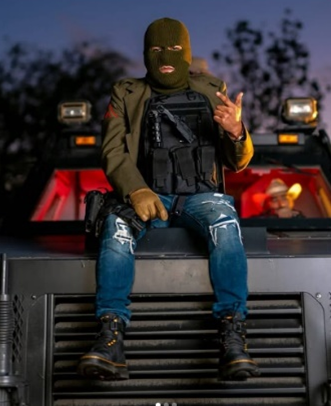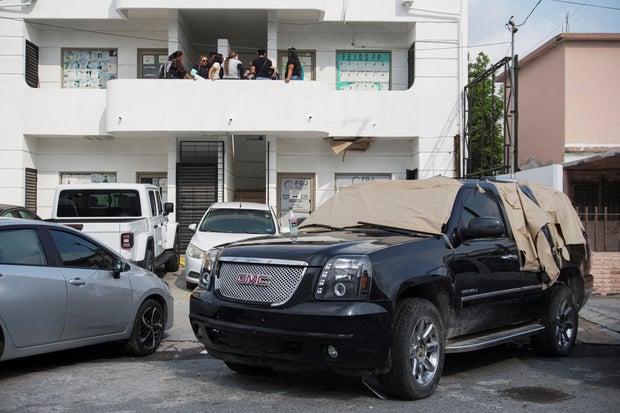The Trump administration mentioned Wednesday it was sanctioning Mexican musician Ricardo Hernández, often called “El Makabelico,” over allegations that the artist was laundering cash for a drug cartel.
The transfer comes after the administration has stripped the visas of a few of Mexico’s most well-known musicians, concentrating on these whose genres usually discover themes associated to cartels.
The U.S. Treasury Division accused Hernández, a musician they check with as a “narco-rapper,” of being related to the Cartel del Noreste, CDN, an evolution of the previous Zetas Cartel. In accordance with the division, he laundered cash for the legal group by concert events and occasions. The CDN is one among a number of Latin American organized crime teams that the Trump administration has designated as a overseas terrorist group.
The administration alleges that fifty% of Hernández’s royalties on streaming platforms go on to the cartel, resulting in his sanctioning alongside leaders of the cartel on allegations that he acted for or on behalf of the legal group.
Hernández didn’t instantly reply to a request for remark.
“CDN depends upon these various income streams and cash laundering strategies to spice up their legal enterprise, diversifying their earnings past legal exercise like drug trafficking, human smuggling, and extortion,” wrote the Treasury Division in a news release.
The sanctions would block the rapper’s properties within the U.S. and freeze monetary transactions with any companies owned by these sanctioned, and threaten secondary sanctions towards overseas monetary establishments that do enterprise with them.
Hernández, whose stage title is a play on phrases referring to cartels, performs his songs carrying a black ski masks and sometimes sings songs associated to the legal teams, making reference to road life, cartel life and the realities confronted in cartel-dominated areas.
U.S. Treasury Division
Lately, younger artists like Peso Pluma have introduced Mexican genres into the worldwide highlight by mixing conventional rhythms with entice and different types, competing with world stars together with Taylor Swift and Bad Bunny on streaming platforms.
The genres — primarily “narco-corridos” — have additionally change into the middle of controversy as a result of quite a lot of artists sing about cartels and “narco tradition” related to them. Some songs romanticize criminals, whereas others converse to the tough realities of youth dwelling in cartel-controlled areas, much like rap music within the U.S.
A number of areas within the nation have banned “narco-corridos,” sparking a recent riot throughout a live performance after a singer refused to carry out a few of his hottest songs.
The music has lengthy fueled a debate in regards to the tremendous line between creative expression and censorship, as quite a lot of Mexican states have beforehand banned performances of sure genres.
In current months, the Trump administration has revoked the visas of a slew of artists associated to the style. In Might, the well-known northern Mexican band Grupo Firme, which has taken steps to distance itself from the cartel-centric themes of the style, introduced it must cancel an upcoming show in California as a result of its visas had been suspended.
In April, the administration mentioned it was revoking the visas of the band Alegres de Barranco after they flashed the face of a cartel boss behind them at a live performance, prompting an issue and even legal investigations in Mexico. In June, the band launched an anti-narco music in a bid to clear its name.
Musicians focused by legal teams
Mexican musicians have beforehand been focused by legal teams that pay them to compose and carry out songs that glorify the exploits of their leaders.
Such performers usually stay in shut proximity to their drug lord patrons, and might at instances get caught up in gang turf battles.
In Might, 5 members of the group Fugitivo had been discovered useless in Tamaulipas state, days after being employed to carry out a live performance. Their deaths had been blamed on suspected drug traffickers.
Stringer / REUTERS
In January this yr, a small aircraft was reported to have dropped pamphlets on a northwestern metropolis threatening round 20 music artists and influencers for alleged dealings with a warring faction of the Sinaloa drug cartel
In 2018, armed males kidnapped two members of the musical group “Los Norteños de Río Bravo,” whose our bodies had been later discovered on the federal freeway connecting Reynosa to Río Bravo, Tamaulipas.
In 2013, 17 musicians from the group Kombo Kolombia had been executed by alleged cartel members within the northeastern state of Nuevo Leon, allegedly due to hyperlinks to a rival gang.
Agence France-Presse contributed to this report.
This is premium stuff. Subscribe to read the entire article.
Support Greater and Subscribe to view content














